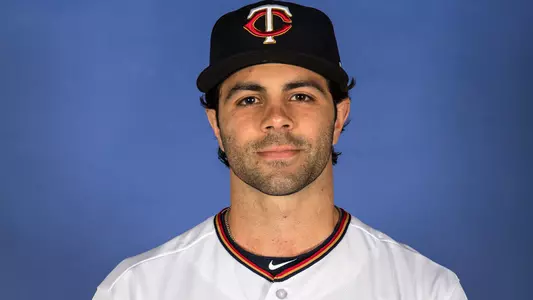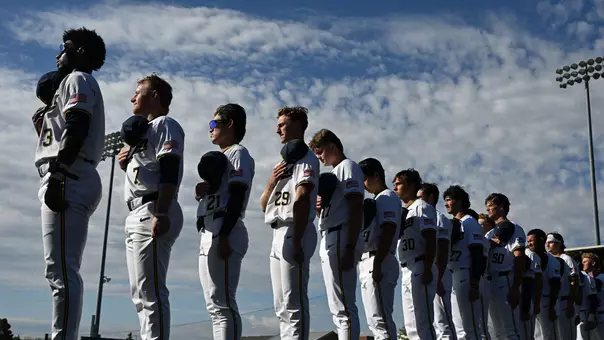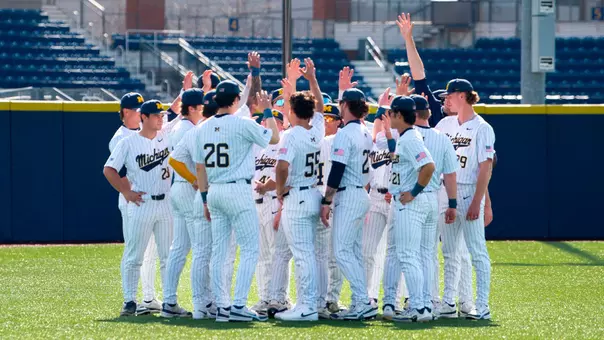
LaMarre's Path to Twins: Five MLB Teams, 11 Minor League Cities & a Titanium Tibia
6/14/2018 12:48:00 PM | Baseball, Features
By Steve Kornacki
DETROIT -- Time, it is said, marches on. And it was beginning to do so without Ryan LaMarre in a baseball uniform.
He was 29 years old and had just two hits in 37 at-bats in the big leagues through 2017, the final months of which he spent without a team. He knew this is not what the Cincinnati Reds envisioned in 2010 when they drafted him in the second round out of the University of Michigan, nor was it what he expected.
"The talent's always been there," said LaMarre, nodding his head as he spoke in the dugout at Comerica Park. "You just feel that, whether it's your health or your lack of consistency, there is a reason they picked you in the second round. It's just, 'How can you put it together?'"
That's finally beginning to happen for LaMarre, who has been starting in center field for the Minnesota Twins with Byron Buxton on the disabled list, and made the Opening Day roster for the first time in his career.
LaMarre (luh-MAHR) missed most of 2014 when surgeries were required to repair both a hernia and a left leg that had nearly snapped in two. He rolled up his baseball pants and pointed to the scar just below his knee cap where a titanium rod was inserted all the way down to his ankle and attached with a screw, providing the stability his tibia no longer could.
"I thought it was shin splints," said LaMarre, "but they X-rayed it and it was cracked half way through the bone. Do you remember Kevin Ware, the guy from Louisville basketball who broke his leg (and had the shin bone pierce his skin)? I went to the same doctor he had in Louisville, and he said, 'Do you know Kevin Ware? That could've been you on any step, breaking and the leg dangling.
"They gave my bone a chance to heal after they fixed my hernia, and it never did. So, they said the only option was to put the rod in."
Cincinnati, after his lengthy rehab, called up LaMarre for the first time in August 2015 -- he went 2-for-25 (.080) -- and the Reds let him go as a free agent. From there, he played five games for the Boston Red Sox, signed with the Los Angeles Angels, was traded to the Oakland A's, playing in three games for them in 2017.
The minor leagues became his home.

He is strong defensively and can run like a deer. However, LaMarre, who hit .419 in 2010 for the Wolverines, could not get his bat going whenever the major league call-ups came. He was batting .054 with zero extra-base hits and runs batted in entering this season.
LaMarre thought long and hard about that this winter, going into the offseason without a team.
He said, "I thought, 'I think I'll get another chance somewhere.' But you never know."
LaMarre got proactive, hooking up with his own hitting coach in search of a stroke and approach that would allow him to stick in the big leagues.
"For the first time in my life," said LaMarre, "I worked with a coach to tighten up my swing. With all the time I missed, teams still said, 'Just be an athlete and go figure it out.' But when you're swing isn't right, how are you going to compete?
"I worked with a guy who was recommended to me by guys I had played with. This guy literally changed my career. We hit five days a week in Jupiter, Florida, beginning in October, and without him, I just don't think the consistency would've come for me."
LaMarre said he currently is unable to divulge the name of the hitting coach because he works for another major league team.
GETTING A CHANCE WITH TWINS, MOLITOR
Members of the Twins coaching staff spoke with his hitting coach, triggering interest that resulted in LaMarre signing a minor league contract on Nov. 22 with an invitation to major league spring training. He made the most of getting his foot in the door, batting .475 (19-for-40) with four doubles, two homers, one triple and 10 RBI, while leading the club in hits and runs.
"He got a chance with us at spring training," said Minnesota manager Paul Molitor, the Hall of Famer who collected 3,319 hits over 21 seasons. "Probably at the start I would've said he didn't have much of a chance, but he had a really nice spring. Some of the work he put in last winter -- changing his swing to give him more of a chance to drive the ball -- paid off."
LaMarre had the game he always knew was possible on April 18 in San Juan, Puerto Rico, where the Twins played two regular-season games against the Cleveland Indians. He entered that game for center fielder Max Kepler in the eighth inning and went 3-for-4 with the biggest hit of his career.

With the bases loaded and nobody out in the bottom of the 16th inning, LaMarre lashed a single up the middle against Josh Tomlin on a 1-2 pitch for a walk-off win. Twins starting pitcher Jose Berrios was the first to reach LaMarre between first and second base. He doused him with a water bottle and a bucket of bubble gum, and then LaMarre jumped into the arms of hefty slugger Miguel Sano as a wild celebration ensued.
"It was unbelievable," said LaMarre, noting that he struck out earlier with a chance to win the game. "I prayed for another chance, and I got it. I'd never faced Tomlin, but I knew he threw cutters, and just stayed back and tried to hit something in the air to the right side. I got down two strikes, but got a good pitch -- a cutter down and away -- and just stayed on it.
"Then, after the hit, it was chaos. Berrios was so excited because he'd pitched so well in that game. I know he was amped up back in his home country, and everybody on this whole team is just so happy for each other. They knew I hadn't played a ton in the big leagues and were so happy for me."
LaMarre started Tuesday and Wednesday (June 12 and 13) against the Detroit Tigers, getting one RBI, one hit and making several defensive plays that showcased his great anticipation, reads and routes to hard-hit balls in center. He's batting .253 with 21 hits (four doubles) and eight RBI after 83 at-bats over 35 games -- and also pitched two-thirds of an inning during a blowout at Yankee Stadium.
He credited hitting coach James Rowson, assistant hitting coach Rudy Hernandez and Twins players Brian Dozier and Eduardo Escobar for their tips and support. LaMarre noted that Rowson's decision to allow him to stay with the changes he had made was critical, adding that many coaches would have tried to push their own approach on him.
Torii Hunter, now a special assistant in baseball operations for the Twins after a standout career in the big leagues, has helped LaMarre slow down the game.
"Torii told me that when he stepped in the batting box, he would look at the catcher and always say, 'We'll see what happens. You never know.' He said the whole point of that was that some days I'm going to get you, but some days you're going to get me.
"Now, when I say those words to myself, I feel like I might strike out, I might get a walk, I might hit a homer. Approaching the game that way has kept me from walking around as much on pins and needles. He said, 'You need to accept failure in this game, and you need to figure out how you're going to accept it.'

"If you panic in this game, you wash out really quickly. You see the players with a care-free attitude in this game and it's like, 'Some days you're the bug. Some days, you're the windshield.'"
LaMarre has made an impression on Molitor, who said, "He's gotten a little bit of an opportunity to play. I know he has a really, really strong desire to go out there and compete, which everybody believes they have. But for him, it's real. His team-first mentality is real. He's a guy that when he gets the opportunity, after all that he's been through, I was really happy to give it to him."
LaMarre said of Molitor: "He's been unbelievable to me. He heard about the changes I was making and saw the results in spring training. So, we really started communicating about my swing and hitting. I bounce things about hitting mechanics off him. I ask, 'Why did you do this when you played?' I know more about his stance than he probably realizes."
Molitor had a short, quick stroke, and his 39-game hitting streak in 1987 was the fifth longest in the history of the game.
"When I knew he was going to be my manager," said LaMarre, "I started watching video of him."
Molitor noted, "He's a thinker, and I've had a lot of conversations with him about things he wants to get better at, things he can get better at, base running and about life up here. We talk a lot of hockey, too."
LaMarre scored 80 goals for Jackson (Michigan) Lumen Christi, and was All-State in that sport, too. He earned 12 varsity letters and also set the school record with 339 career tackles.
"I played hockey my whole life," said LaMarre. "When (Molitor) was at (the University of) Minnesota, he said the hockey players were the kind of guys he hung out with. I think he gets a laugh out of some of the things I say, but he knows how hard I worked to get here and how hard I work every day."
Molitor added, "It's been a good connection. He married a girl from Edina, which is where I live in Minnesota. I actually ran into his mother-in-law at the Walgreens a couple of weeks ago. It's a small world."
MEETING HIS WIFE, WINNING A CHAMPIONSHIP AT MICHIGAN
LaMarre met Whitney Taney at Michigan, where she was a three-time All-Big Ten tennis selection and left with a school-record 114 doubles victories. She later was the associate head coach for the University of Minnesota.
The Wolverines were Big Ten regular-season and tournament champions during his freshman season of 2008, going 46-14 and advancing to the NCAA Regional. LaMarre started 40 games and batted .305 on a team that featured outstanding pitchers in future major leaguer Zach Putnam and current Michigan pitching coach Chris Fetter. They combined to go 19-2.

"Chris was one of those teammates that even though he was one of the guys, he had that sense of leadership about him," said LaMarre. "He was a coach on the field and the coach's right-hand man in terms of getting everything organized on the field."
Rich Maloney, the 2008 Big Ten Coach of the Year, set the tone for LaMarre.
"My dad (Kevin) went to Michigan State and I grew up a Michigan State fan," said LaMarre. "But Rich recruited me, and I felt such a better connection with Rich than the guys at Michigan State.
"Then, he wasn't hesitant to plug me in from Day One. I got hot late in the year, and he told me, 'Listen, we're going to lose a lot of people to the draft. You're going to be our guy for the next two years, hitting in the three hole and playing in the outfield.'
"For him to see that in me took my expectations to the next level. He was always telling me how great I could be, and how I could help the team. I still talk to him on a pretty regular basis."
LaMarre was first team All-Big Ten as a junior, when he also won the Bill Freehan Award as the team's top hitter, batting .419. He hit .356 with 20 homers and 125 RBI over three seasons.
Which, of all his accomplishments, makes him the proudest?
"Winning the Big Ten championship my first year," he said. "Everything just boils down to winning. This year, we're having a 10-year reunion for the 2008 team. They don't have a 10-year anniversary for a guy who hit .419."
LaMarre batted .303 in 2016 for Triple-A Pawtucket, and that has been his best effort in pro ball. He's played as far east as Massachusetts, as far west as California, and places in between like Pensacola, Florida and Nashville, Tennessee.
He is excited to be getting his first stay of any length in the majors after having been part of five major league organizations, playing in 11 different minor league cities and enduring a grueling season when he received that titanium tibia.
What's gotten him through it?
"Honestly," LaMarre said, "it's tough. But you need a good support system. My wife, my parents, my sisters and my in-laws have been incredible. There are times, when it doesn't matter how strong you are. You just say, 'I'm sick of this. I'm over this.'"
Then he picks up the bat once again.
He never gave up on his dream, never forgot where he came from and never ceases being an example of where dedication and perseverance can get you.










